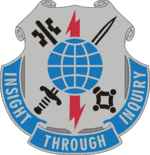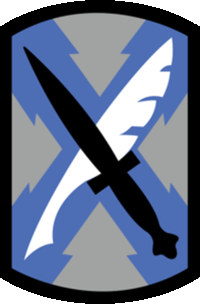300th Military Intelligence Brigade (United States)
| 300th Military Intelligence Brigade | |
|---|---|
|
300th Military Intelligence Brigade shoulder sleeve insignia | |
| Country | United States |
| Branch | U.S. Army |
| Role | Linguistic |
| Size | 1400 |
| Insignia | |
| Distinctive Unit Insignia |
 |
The 300th Military Intelligence Brigade is a United States Army formation, subordinate to the United States Army Intelligence and Security Command (INSCOM) part of the Utah Army National Guard and headquartered at the Utah National Guard Headquarters building in Draper, Utah.
Formed in 1988 from the 142nd Military Intelligence Battalion, the 300th provides linguistic support to the U.S. Army throughout the world. Numbering approximately 1400, with approximately 90% being trained Army linguists, the soldiers are organized as five-person teams, trained in HUMINT (such as interrogators), counterintelligence, and SIGINT (such as voice intercept and analyst) skills. The brigade covers 19 documented languages, heavily oriented toward Arabic, Persian, and Korean.
Organization
Currently, the brigade has six battalions:
-
 141st Military Intelligence Battalion (National Guard - Utah)
141st Military Intelligence Battalion (National Guard - Utah) -
 142nd Military Intelligence Battalion (National Guard - Utah)
142nd Military Intelligence Battalion (National Guard - Utah) -
 223rd Military Intelligence Battalion (National Guard - California)
223rd Military Intelligence Battalion (National Guard - California) -
 260th Military Intelligence Battalion (National Guard - Florida)
260th Military Intelligence Battalion (National Guard - Florida) -
 341st Military Intelligence Battalion (National Guard - Washington)
341st Military Intelligence Battalion (National Guard - Washington) -
 415th Military Intelligence Battalion (National Guard - Louisiana)
415th Military Intelligence Battalion (National Guard - Louisiana)
Service
Units have taken part in U.S. military operations worldwide from the Gulf War to current operations in Bosnia-Herzegovina, Kosovo, Iraq, Kuwait and Afghanistan, and played a major role in protecting the 2002 Olympic Winter Games in Salt Lake City.
See also
- Battlefield Surveillance Brigade, The United States Army is currently reorganizing its intelligence formations into Battlefield Surveillance Brigades (BfSB).
Notes
References
- "300th Military Intelligence Brigade". Military Intelligence Professional Bulletin. April–June, 2004. Retrieved 8 July 2008.
